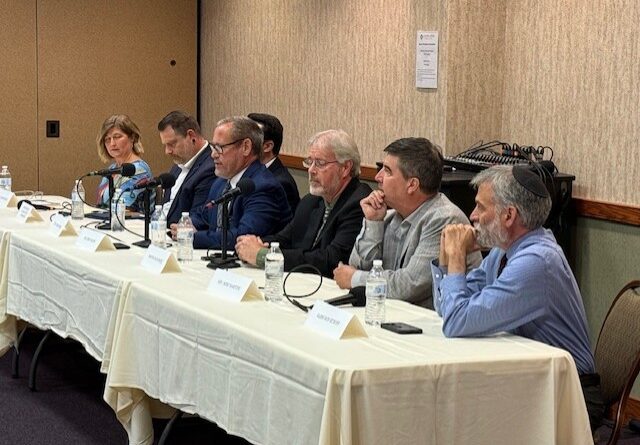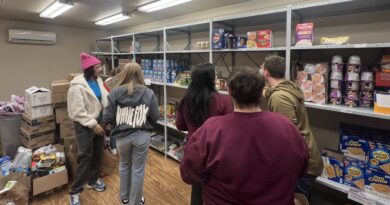Clergy, pols discuss common ground
Panelists address overlap of religion and politics
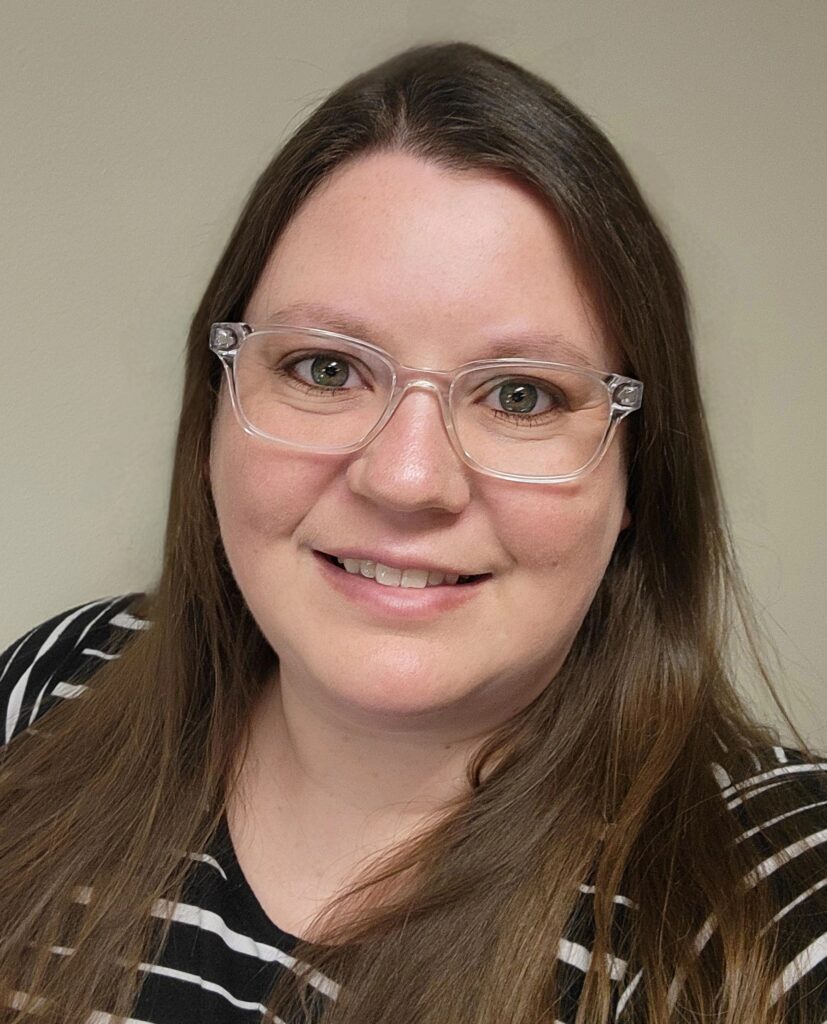
By Colleen A. Hiltl
Knightly News Reporter

“A priest and a rabbi walk into a coffee shop.”
It’s the start of a well-known joke about clerics in two vastly different religions.
But jokes aside, even people with differing beliefs can find common ground.
Today’s climate is heavy with political divide that trickles down to everyday issues. And that’s what compelled a diverse group of seven panelists (a mix of academics, politicians and clergy) to walk into Central Penn College’s Conference Center last month for the summer term’s The Knights’ Roundtable discussion on religion and politics.
Okay: A priest was not among the panelists, but a rabbi was, along with three Lutheran ministers, an academic, a Catholic nonclergy leader and a politician.
The conversation, moderated by Central Penn Associate Vice President of Student Services Erika Wilkinson, was open to the college and off-campus community. It included the opportunity for audience members to ask questions, hear the panelists’ experiences and learn about some of challenges clergy and politicians face in a political climate that has often touched on religious issues.
About 40 people attended.

Listen!
A common theme arose throughout the discussion, and no, it wasn’t about who was right or wrong. Instead, it was about the surprising connections people can make when they take the time to find common ground.
And that starts with listening.
To kick off the conversation, Samantha Bise, who teaches humanities and social sciences at Penn State’s Hazleton and Lehigh Valley campuses as well as at Lehigh Carbon Community College, helped set the stage in defining politics versus partisanship.
Bise said that the word “politic” comes from the word “polis,” which means city.
“Politics is just how we arrange our shared lives … to be, as a church, political, is okay,” Bise said. “To be partisan—to be loyal to something that isn’t Christian, but to a party or a figure—that’s not the church’s place.”
Faith has a place
Eric Failing, executive director of the Pennsylvania Catholic Conference, said when asked what political party he aligns himself with “I’m not an ‘R’ and I’m not a ‘D,’ I’m a ‘C’ (Christian).”
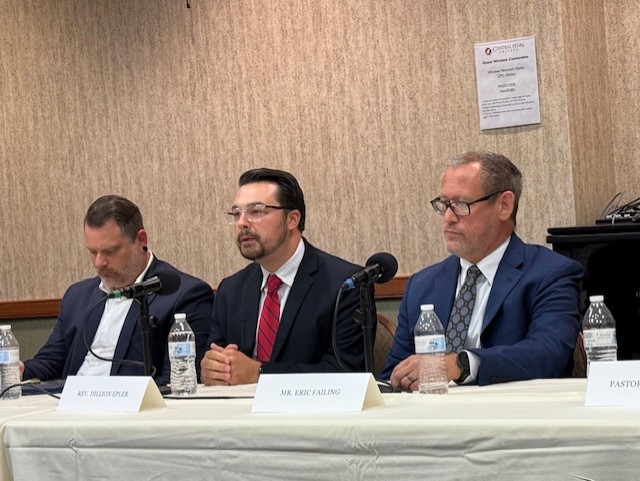
Photo by Diane McNaughton
For these panelists, faith’s role is not only about a party platform but a commitment to human connections.
“The role of religion in politics is to go out and find common ground with everybody,” Failing said. “Go out and meet everybody, … because we’re in the business of saving souls.”
Not all the conversation was uplifting, however. Dauphin County Commissioner Justin Douglas expressed a genuine concern about the rise of Christian nationalism, which he has witnessed become a “weaponization of faith.” He’s worried that his faith, which he believes is meant to bless, could be used for harm.
Building bridges
But then, as a testament to the unexpected connections that can come from conversation, Rabbi Ron Muroff, spiritual leader for the Chisuk Emuna Congregation, in Harrisburg, shared a moving story about the time his synagogue burned late pn a Friday evening. After a heart-warming outpour of support and aid from the community, a local Christian Orthodox priest reached out to Muroff, asking to connect at a West Shore Starbucks. The rabbi recognized the priest instantly from the priest’s traditional attire. They met and Muroff said he found an unlikely connection with the priest.
The priest’s church, Muroff discovered, was a sister church to the same church in Ukraine where the rabbi’s grandfather once hid from members of that church during a tumultuous time in that country for Jews. Yet, instead of finding animosity, Muroff found a new perspective for the crucifix—a symbol, Muroff said, that often is viewed as a representation of hate, oppression and death for his people.
After their meeting, Muroff found he could see the symbol “in a different sort of way and really feel the love that had prompted this man to ask members of his church to contribute to our synagogue.” It was a powerful reminder that genuine respect can shatter old prejudice.
The panel unanimously agreed on the need for more face-to-face interactions and connections.
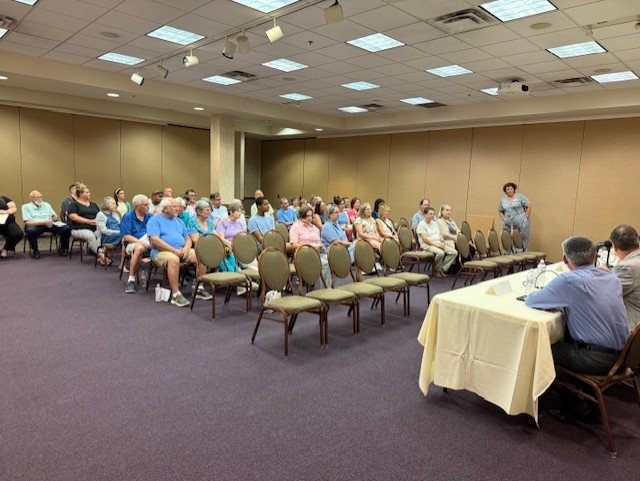
Photo by Diane McNaughton
Don’t be complacent
The temptation, as the Rev. Dillon Epler, of St. John’s Evangelical Lutheran Church, in Tamaqua, noted, is to “sit on your La-Z-Boy and put nasty comments on Facebook.” But real connection, he said, comes from sitting together, “in a pew, at a borough council meeting or sharing a cup of coffee.”
Epler, a Central Penn alum, said “people don’t talk to each other anymore.” He explained that regardless of what “side of the aisle’ they’re on, there’s constant competition.”
The Evangelical Lutheran Church in America (ELCA) uses social statements to help clarify their standpoints on social issues. Two of the panelists were pastors ordained in the ELCA and helped shed light on some of the discussion topics.
Epler shared that recently, his synod (a group of churches in a defined geographical area) was meeting to vote on a new social statement. It addresses the need to be careful when speaking or preaching about politics, a topic that has been in the news lately because of the IRS’ position that churches can endorse political candidates, something nonprofits—as most religions are—have been unable to do without losing their nontaxable status since the 1950s.
The pastors in Epler’s synod were required to make a statement to their congregations that it is not the church’s place to tell them who to vote for.
“But what I should do is talk about the issues—about people who are unhoused, about people who are hungry, people who are struggling to seek healthcare,” he said. “That I am required to speak to because those are social issues, and the church has certain positions on those.”
Know what’s what
The confusion the church faces today has to do with knowing what is “political” and what is “partisan.”
“You could be a Democrat or you could be a Republican, you could be an Independent, a Libertarian, you could be a part of the Green Party—it doesn’t matter, but what happens when you sit in the pew and you’re hearing lessons from the Hebrew scriptures and the gospels and Paul’s letters, when you’re sitting all together, you’re a Christian,” Epler said. “You can be different political parties, but how do we talk to each other?”
The panelists shared much of the same theme: Find common ground; to achieve that, we must be willing to listen and meet people where they are, they agreed.
It’s about coming together, regardless of your individual views.
Some clergy make political views known
The Rev. Mike Maritine, senior pastor of Trinity Lutheran Church, in Mount Joy, said he sees in many churches how the message being shared makes it clear what party they closely align with.
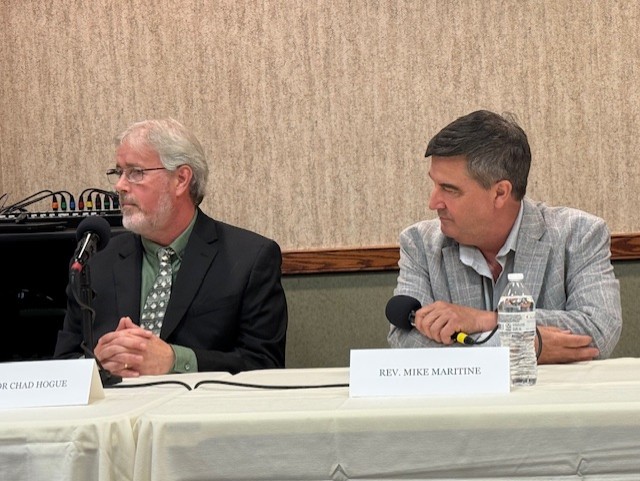
“I tend to watch a lot of church services in the area and there are plenty of churches that make it very clear who you’re supposed to vote for,” Martine said, “which we would never do.”
Near the end of the session, Bise commented that first, as a mother, she wants to raise her children to do better, as Christians and to find community (to not be alone), but also to teach them that to be a part of a community, they must first “show up.” That begins with being present, she said.
Chad Hogue, senior pastor at New Hope Church (Brethren in Christ), Harrisburg, was the other panelist.
Hiltl is also Central Penn’s marketing project coordinator.
Comment or story idea? Contact [email protected].
Edited by media-club co-adviser and this blog’s editor, Professor Michael Lear-Olimpi.

